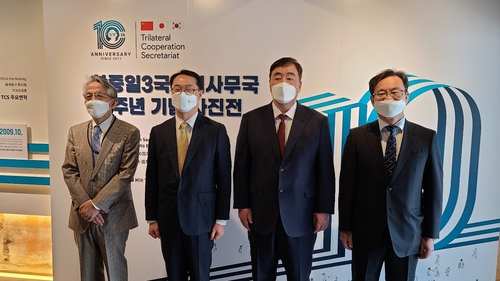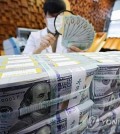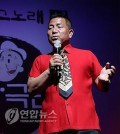- California Assembly OKs highest minimum wage in nation
- S. Korea unveils first graphic cigarette warnings
- US joins with South Korea, Japan in bid to deter North Korea
- LPGA golfer Chun In-gee finally back in action
- S. Korea won’t be top seed in final World Cup qualification round
- US men’s soccer misses 2nd straight Olympics
- US back on track in qualifying with 4-0 win over Guatemala
- High-intensity workout injuries spawn cottage industry
- CDC expands range of Zika mosquitoes into parts of Northeast
- Who knew? ‘The Walking Dead’ is helping families connect
(LEAD) Japan ambassador says S. Korea can take part in IAEA monitoring team for Fukushima water release
Japanese Ambassador Koichi Aiboshi said Monday that he thinks South Korean experts can be part of a U.N. nuclear watchdog-led monitoring team for his country’s planned release of radioactive water from its crippled Fukushima nuclear power plant.
South Korea has expressed concerns about potential health risks over Japan’s plan to release over 1.2 million tons of Fukushima’s contaminated water into the Pacific Ocean and said it wants to take part in safety verification efforts by the International Atomic Energy Agency (IAEA).
On Monday, Aiboshi said South Korea’s participation would be possible.
“We think so,” the ambassador said when asked by reporters whether South Korean experts would be able to take part in the monitoring team. “But that is a matter to be consulted on between the IAEA and the South Korean government.”
The envoy spoke after attending the opening ceremony of a photo exhibition marking the 10th anniversary of the Seoul-based Trilateral Cooperation Secretariat aimed at enhancing cooperation between South Korea, China and Japan.
Aiboshi said Japan will make “various” efforts to provide Seoul with information about the discharge.
“We have provided information in advance as much as we possibly could,” Aiboshi said. “If that is not sufficient, and I believe there are people who think so, we will make various efforts,” he said.
Japan will work to ensure safety in the disposal process, he said.
“It is also an issue concerning the Japanese people and the health of neighboring people. The IAEA will dispatch a team and they will properly monitor it,” he said.
Meanwhile, Chinese Ambassador to Seoul Xing Haiming and South Korean Deputy Foreign Minister Kim Gunn also attended the photo exhibition celebrating the secretariat’s 10th anniversary.
“Cooperation between the three countries has a great significance to the three countries in achieving their own development, managing regional peace and stability and fostering world prosperity,” Xing said in his congratulatory speech.
Kim expressed hope that the exhibition, running through next Wednesday, will “serve as an occasion whereby the trilateral cooperation could further strengthen” as many shared challenges, such as the coronavirus pandemic, climate change and the fourth industrial revolution, lie ahead.
The TCS office was set up in 2011 at then-South Korean President Lee Myung-bak’s proposal to improve relations and bolster exchanges.
The secretariat is also charged with helping organize the trilateral summit between the three countries. The last 8th summit between the three countries was held in the Chinese city of Chengdu in 2019.

From left to right, Japanese Ambassador Koichi Aiboshi, South Korean Deputy Minister for Political Affairs Kim Gunn, Chinese Ambassador Xing Haiming and Trilateral Cooperation Secretariat Secretary General Hisashi Michigami pose for a photo at a photo exhibition held in Seoul on April 19, 2021, to mark the 10th anniversary of the launch of the secretariat established to improve relations and enhance exchanges. (Yonhap)











